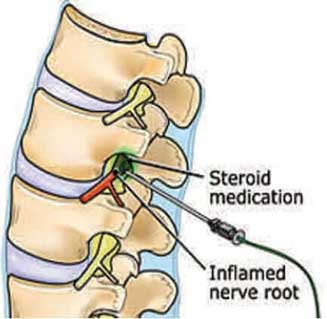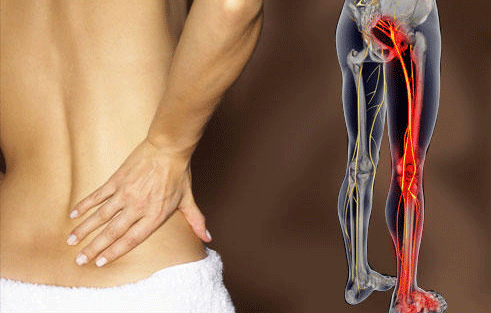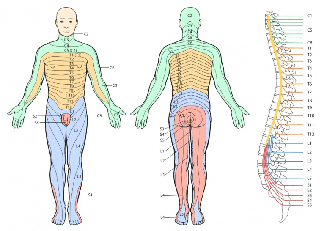Pinched Nerve and Radiculopathy
What is a Pinched Nerve?
Radiculopathy is the pain, numbness and sometimes weakness that results when an injury occurs to a nerve root. This type of injury is often referred to as a “pinched nerve”. These nerves originate from the spinal cord and snake by disc tissue and through openings in vertebral bone to journey on their way to the peripheral tissue. When these nerves are pinched or stretched, the pain results in the pathway of that nerve. Although these nerve roots can be damaged at any point along the spine, the most common sites are the neck and the lower back, the cervical and lumbar regions, respectively:
- A pinched nerve in the neck, the cervical region usually manifests as pain in the neck, shoulders, arms, and hands.
- A pinched nerve in the lower back or lumbar region can cause pain in the lower back, buttocks, hips, and legs.
- A pinched nerve in the in the thoracic region, or the mid back, can cause pain in a belt like pattern around the torso.
Who gets it a pinched nerve?
Radiculopathy of either region is usually a result of a herniated disc which pinches on a nerve. The disc tissue breaks free of its protective sheath and pushes against the nerve root, causing a pinched nerve and the associated symptoms. Those at most risk for herniated discs and a pinched nerve are patients who are obese or elderly, in addition to those who lift heavy objects or play contact sports. Most of these conditions cause the degeneration of the discs or trauma to them that leads to herniation and pinching of the nerve. In the case of older age, the discs become brittle and are more likely to break. Also, in older age, arthritis develops in the joints in the back between vertebrae, which can enlarge and make the holes smaller for the nerves to travel through. Essentially anyone is at risk for a pinched nerve trough activities, aging, or trauma.
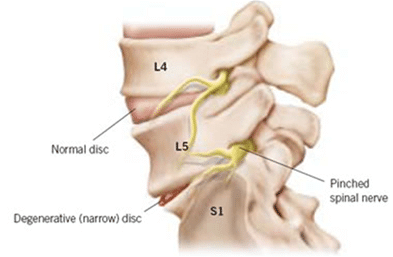
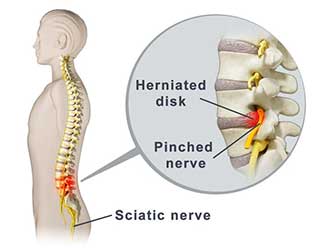
What kind of pain results?
The pain that results from a pinched nerve and radiculopathy can be categorized as nerve pain, and that means it has a few different characteristics. First, the pain may be intense, and some patients refer to it as an electric shock type pain. However, some also report an aching or burning pain, and usually the sensation will travel down the limb the nerve root serves. With lumbar radiculopathy, the pain generally flows down the leg, called sciatica. Second, you may have a tingling feeling in the area served by the nerve root, and in some cases, you may actually experience numbness. In very rare instances, weakness can occur in the muscles that the nerve supplies. In this case, a limb may feel heavy or a movement involving the affected muscle may be difficult to perform. If a nerve in the lowest part of the spine, the sacral spine is severely pinched, then control of bowel and bladder habits will be similarly interrupted. If weakness in a limb or disruption of control of bowel or bladder function occurs, you should call your doctor, who may send you to the nearest emergeny room for immediate evaluation. Mostly, radiculopathy and pinched nerve pain results in pain that travels down the arms or the legs, depending on the region affected.
Treatment for a Pinched Nerve and Radiculopathy
An MRI of your spine will likely be ordered to determine the cause of the pain. Fortunately, Pain Medicine physicians can do quite a bit for both cervical and lumbar radiculopathy that result from a pinched nerve. In general, most people suffering from a pinched nerve and radiculopathy will feel better in a few weeks with NSAIDs (ibuprofen, naproxen, etc) and/or exercises done in a physical therapy program. If NSAIDs are not strong enough to control your pain, or you have too much pain to participate in physical therapy, then you should see a Pain Medicine physician.
Epidural steroid injections are the procedure of choice for a pinched nerve and radiculopathy. These injections require XRay guidance, called a fluoroscope to place a needle close to where the nerve injury occurred to deposit local anesthetic and steroids, which are strong anti-inflammatory agents. Steroids quiet the nerve and reduce inflammation around it. These injections are performed in the office with local anesthetic. If you are nervous about the procedure, a medication can be prescribed in advance to relieve any procedure related anxiety.
There are other medications that can be used for pain due to a pinched nerve and radiculopathy such as anti-depressants and anti-seizure medications. If medications and injections do not control or eliminate pain, you may be referred to a spine surgeon for a consultation. If your condition is chronic and surgery is not an option, then an implantable spinal cord stimulator may be a good option for you.
